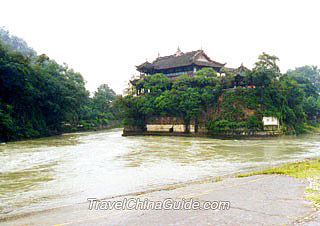3.5 Destruction, Exploitation and Subjugation of Nature
“Without an understanding of the Dao it is indeed possible that knowledge and civilization, science and technology, will doom man to self-slavery and self-destruction. Man simply falls into the bondage of his own conceptual prison and becomes a victim of his own desire.” (Cheng, 1986, p.357-358).
Laozi cautions those who go against nature: “That which goes against the Dao will come to an early end” (Daode Jing, Ch.55). The traditional human nature relationship of connectivity in China has sadly diminished with the advent of the dominance of power epistemology, as Laura argued (see R. Laura, Technology and Nature in Harmony). As a result, there is a value shift which has taken place in China towards ‘power epistemology’ and thus the traditional Chinese worldview of achieving a harmonious relationship between humans and nature has been marginalized since 1949 and especially since the 1980s (Deng et al., 2006). The challenges to man-nature harmonious relationship in recent Chinese history came mainly from two stages. First stage was represented by the great chaotic years of the “the Great Leap Forward” and “the Great Cultural Revolution”. The radical official ideology based on Marxism, Leninism and Maoism, was characterized as class conflict and anti-traditionalism. The popular tradition such as Daoism, Confucianism and the other rich philosophical legacy of ancient Chinese wisdom was stigmatized as ‘superstition’ and virtually completed destroyed overt popular religious practice (Jenkins, 2002). With an emphasis on subduing and conquering nature, and yet lacking a factual understanding of natural order, Mao initiated a frenzied war against nature (Jenkins, 2002). Nature was set as a target/enemy which, unless conquered, would impede China’s advance into the developed world (Shapiro, 2001). People were described as being so happy to be the masters of nature. It was Mao who said that “battling with nature is boundless Joy (yu tian dou, qile wu qiong)” (quoted in Shapiro, 2001, p.194), and it was he who popularized the slogan “Man must conquer nature (ren ding sheng tian)”. This was the power epistemology need, he thought to accomplish the tasks he commanded such as “Order rivers to change their channels; make mountains give way” (Hou, 1989, p.1990). This God-like power that Faust (Goethe’s hero) sold for have nature and its resources of China abused wilfully and blindly by people through massive deforestation and transformation of all available lands (reclaiming lands through filling in rivers, lakes and the sea) to agriculture use under Mao’s ‘grain-first’ policy (Hou, 1989; Zmolek, 1992; Shapiro, 2001; Oliver-Smith, 2010).
Mao’s ambition of conquering the nature is best expressed by the two ancient stories vaguely promoted during the period of Cultural Revolution. They are “How the Foolish Old Man Moved Mountains” and “The Bird Jingwei Trying to Fill the Sea”. Both of thme are originally used to describe people who are firm and indomitable and will not stop until they reach their goal, however, under the background of the ‘Great Leap Forward’ and the ‘Cultural Revolution’, they became the culprits of unprecedented destruction of environment by brainwashing the common people with the concept of conquering and exploiting nature where it does not fit the people’s purposes.
Story 1: The Foolish Old Man Moved Mountains
Yugong, a ninety-year-old man, decided to level two mountains which blocked his way out. Under the pressure of opposition from his family and neighbors, and laughed at by other people who ridiculed his movement, Yugong determined to do whatever and no matter how long it takes to achieve the goal. And finally his determination moved the king of the gods, who ordered his two sons with great strength to carry the mountains away.
Story 2: The Bird Jingwei Trying to Fill the Sea
The youngest daughter of Emperor Yan was buried by the sea waves during a trip in oceans. Her spirit turned into a beautiful bird called ‘Jinwei’.
Jinwei decided to fill the sea up by carrying a twig or a pebble in her mouth and dropping them into the sea. She did it day after day while flying between the mountain and the sea. And this ‘brave’ little bird kept doing it without taking a rest.
The second stage came in the beginning of the 1980s when China opened up to the West in order to achieve industrialization and modernization. The insatiable need for development hatched the materialism, selfishness, and greediness. Popular practices in current China are “largely pragmatic utilitarian, worldly and reflective of the material tribulations which have traditionally faced the ordinary populace, both personally and communally…long-term conservation is highly subservient to short-term practical human ends” (Jenkins, 2002. P.46). Rapid development of the economy driven by the enthusiastic pursuit of high GDP performance over the past thirty years, coupled with the inadequate environmental conservation inputs, and the weak enforcement of environmental laws and regulations resulted in the severe environmental problems. China’s GDP has grown by 10 percent annually over the last thirty years with the input in environmental management and protection accounting for less than 1 percent of its GDP (Martinsons et al., 1997; Lin, 2008). It is easy to understand why there is such a strong commitment on the part of many officials and others to ensure that China’s GDP continues to grow, as does its international economic reputation. The problem is that to achieve this goal, the accelerated depletion of natural resources and the environment degradation becomes increasingly irreversible (Chen, 1998; Yang, 2011). It is unlikely that the ethical imperative of limited economic growth would be appreciated in China, because ‘development trumps everything’ – a popular slogan which is driven by its preoccupation with power and realization of its strong industrial and production potential. China’s obsession with unlimited economic growth has become an ideological issue, which is directly against ecological ideals such as harmony, interdependence, and a philosophical consciousness of a bio-community which extended to include nonhuman beings within biological community promoted by deep ecology, ecofeminism, social ecology and Daoism as well (Nash, 1990; Deng et al., 2006).


This piece does more than just convey information; it opens up a space for contemplation and deeper thought.